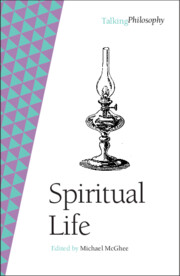Book contents
- Spiritual Life
- Talking Philosophy
- Spiritual Life
- Copyright page
- Contents
- Contributors
- Preface
- Introduction
- 1 Philosophy and Religion in the Thought of Kierkegaard
- 2 De Consolatione Philosophiae
- 3 The real or the Real? Chardin or Rothko?
- 4 Love and Attention
- 5 Descartes’ Debt to Augustine
- 6 Visions of the Self in Late Medieval Christianity: Some Cross-Disciplinary Reflections
- 7 Refined and Crass Supernaturalism
- 8 Religious Imagination
- 9 Moral Values as Religious Absolutes
- 10 Revealing the Scapegoat Mechanism: Christianity after Girard
- 11 Philosophy vs. Mysticism: An Islamic Controversy
- 12 Non-Conceptuality, Critical Reasoning and Religious Experience: Some Tibetan Buddhist Discussions
- 13 ‘Know Thyself’: What Kind of an Injunction?
- 14 Facing Truths: Ethics and the Spiritual Life
- Index
- References
9 - Moral Values as Religious Absolutes
Published online by Cambridge University Press: 18 April 2024
- Spiritual Life
- Talking Philosophy
- Spiritual Life
- Copyright page
- Contents
- Contributors
- Preface
- Introduction
- 1 Philosophy and Religion in the Thought of Kierkegaard
- 2 De Consolatione Philosophiae
- 3 The real or the Real? Chardin or Rothko?
- 4 Love and Attention
- 5 Descartes’ Debt to Augustine
- 6 Visions of the Self in Late Medieval Christianity: Some Cross-Disciplinary Reflections
- 7 Refined and Crass Supernaturalism
- 8 Religious Imagination
- 9 Moral Values as Religious Absolutes
- 10 Revealing the Scapegoat Mechanism: Christianity after Girard
- 11 Philosophy vs. Mysticism: An Islamic Controversy
- 12 Non-Conceptuality, Critical Reasoning and Religious Experience: Some Tibetan Buddhist Discussions
- 13 ‘Know Thyself’: What Kind of an Injunction?
- 14 Facing Truths: Ethics and the Spiritual Life
- Index
- References
Summary
Those who have had the benefit of a reasonably lengthy familiarity with the philosophy of religion, and more particularly with the God question, may be so kind to a speaker long in exile from philosophy and only recently returned, as to subscribe, initially at least, to the following rather enormous generalization: meaning and truth, which to most propositions are the twin forces by which they are maintained, turn out in the case of claims about God, to be the centrifugal forces by which they disintegrate. In simpler language, the greater the amount of intelligible meaning that can be given to the idea of God, the less grounds there would appear to be for assuming let alone asserting, that God exists, at least as a being distinguishable from all the things in this empirical world which are the source of the range of meanings available to us;
- Type
- Chapter
- Information
- Spiritual Life , pp. 236 - 263Publisher: Cambridge University PressPrint publication year: 2024

